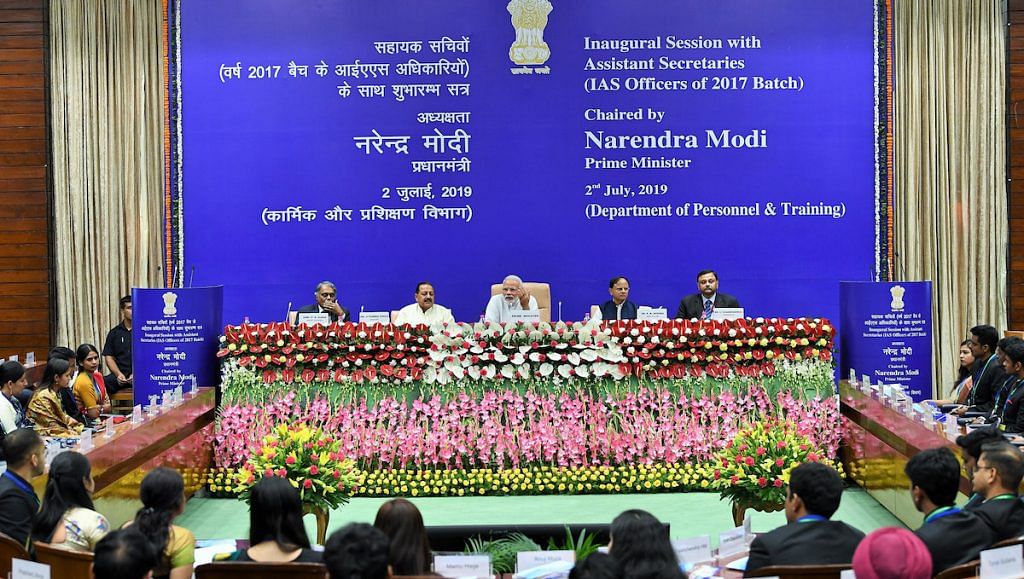There are two ‘babus’ in India.
One ‘babu’ you can find in the conversations of ‘millennial lovers’ and memes. The second ‘babu’ is a much older term. On 10 February, in his Parliament speech, PM Narendra Modi blasted the ‘babu’ culture in the country. He meant the steel frame of India, its civil servants.
To quote PM Modi, “Sab kuch babu hi karenge. IAS ban gaye matlab woh fertiliser ka kaarkhana bhi chalayega, chemical ka kaarkhana bhi chalayega, IAS ho gaya toh woh hawai jahaz bhi chalayega. Yeh kaunsi badi taakat bana kar rakh di hai humne?”
Both the usages of ‘babu’ lead to massive ‘cringe’ now – a Gen Z term.
‘Babu’, in popular culture, implies a government worker who is lazy, incompetent, deliberately delays processes and enjoys life at the cost of public money.
The term that reeks of the colonial era has been stuck with civil servants and other government officials ever since. We need to give up this ‘babu’. Even the IAS Association condemned the use of the word in 2016 and called it ‘abusive’.
Also read: ‘Babu samjho ishare’ — Modi’s critique of IAS evokes shock but many also call for introspection
Babu, a ‘derogatory’ term in New India?
Using the term ‘babu’ for government officials is disdainful. In reality, IAS officers are professionals with varied skillsets, just like the employees of any other office. Most of them have to handle more than one department during their service, but they obviously don’t serve all departments.
Now, the question arises, who benefits from the ‘Babudom’ that the PM referred to? Certainly the Modi government, which has appointed several IAS officers to big posts. Take, for example, Shaktikanta Das, a history graduate, former revenue secretary and what some call a ‘career babu’, who was made the Governor of the Reserve Bank of India. Or R.K. Singh, a former IAS officer, was given two ministries by the Modi government.
‘Babudom’ is enabled only by politicians.
IAS officers, called the steel frame of India by Sardar Vallabhbhai Patel, have been handling the most coveted posts in the government. But they do not appoint themselves. They are appointed by constitutional bodies.
Also read: It’s 2021 and the Indian bureaucracy remains the greatest impediment to progress
Field experience vs domain knowledge
The IAS officers fall under the All India Services, and are posted in the district headquarters initially. There, they gain field experience in health, agriculture, education, environment, law and order, and learn how to implement democratic processes such as elections. Thus, they act as facilitators of the government.
It is possible that they may not have the domain knowledge for all their new postings, such as in aviation, chemical industry or electronics, but it is also true that they have adequate understanding of government procedures. And that makes them indispensable. One can’t bypass procedures in a democracy, because that may invite exploitation of rules and lead to disdain for the rights of people.
This understanding of procedures is so important and crucial that in the much-debated farm laws, the ‘babus’ have been given the authority to deal with dispute settlement. This is ironic given Modi’s speech in Parliament.
Or take the coronavirus pandemic and the migrant workers’ exodus, for example. The government—Centre or states—could only manage the situation because of the officers on the ground – the so-called ‘babus’.
Also read: CMs pick up PM Modi trend, retain trusted chief secretaries as advisers after retirement
Training and more professional attitude
Instead of dehumanising government officers, the State can look at them as professionals with different skillsets. Rather than making disparaging remarks, they may be appointed as per their skillset and domain knowledge, which is not done in many cases and raises questions. An officer is a public servant, but in reality, she/he has to act like a minister’s servant, and that is where the problem lies. If the government is keen on removing ‘Babudom’ from State institutions, political interference in their work should be reduced and the officers treated as professionals.
Everyone knows that by clearing one exam, a person doesn’t become a ‘babu’. It’s the system that treats them as such. The ‘Mai-Baap’ attitude passes on to them and the public starts treating them as ‘Watan Ke Rakhwaale’. With so much pressure and responsibility, they go from being an earnest professional to a forced ‘babu’.
Time to give up that term and culture.
Views are personal.
